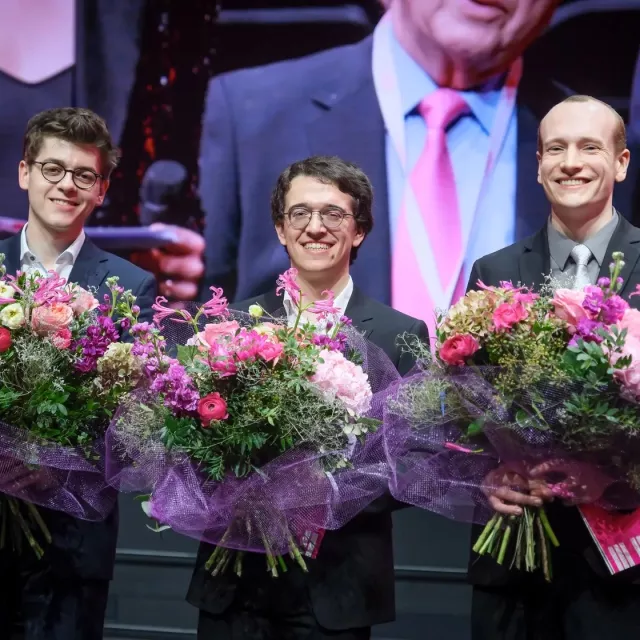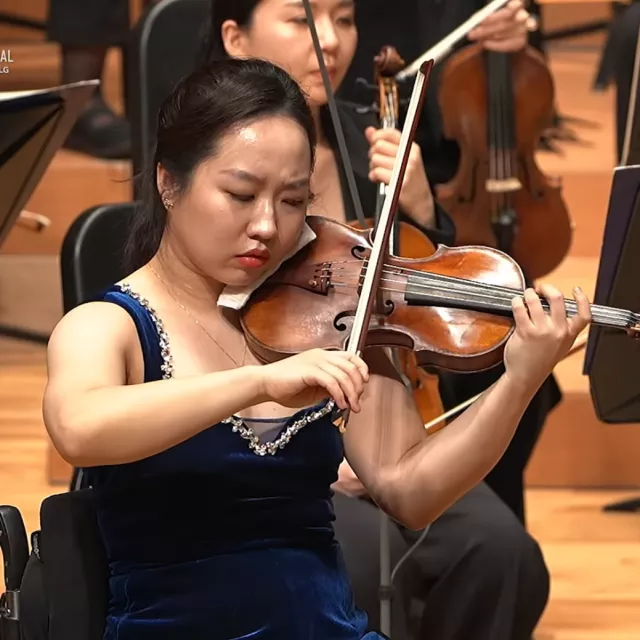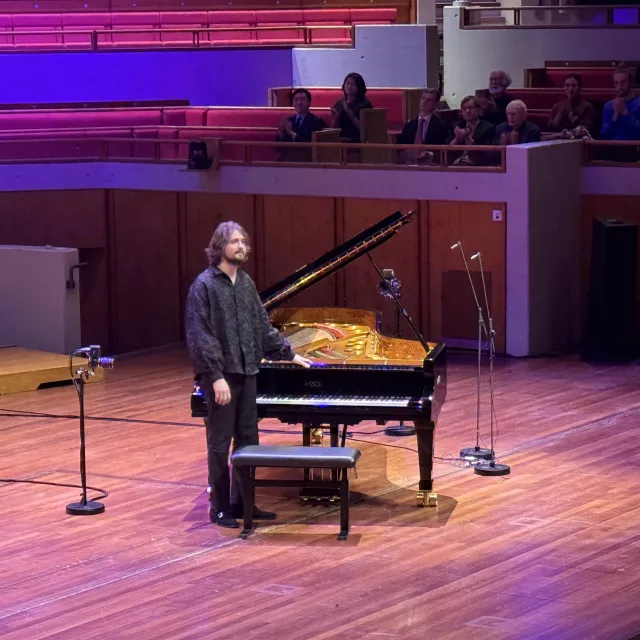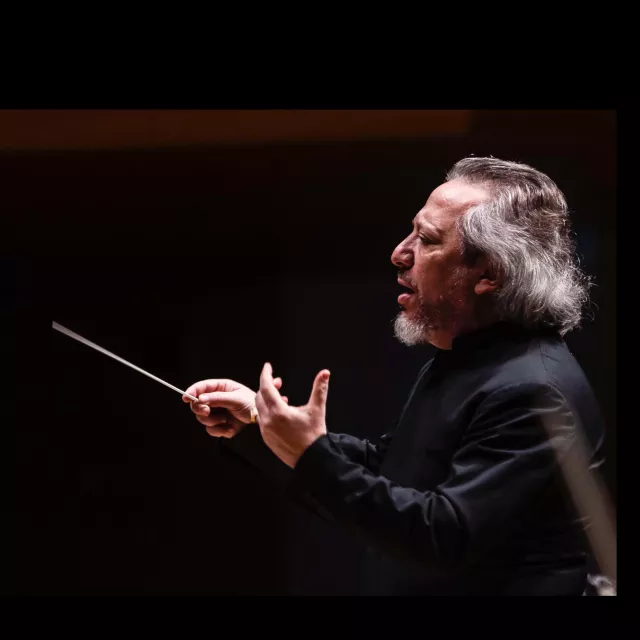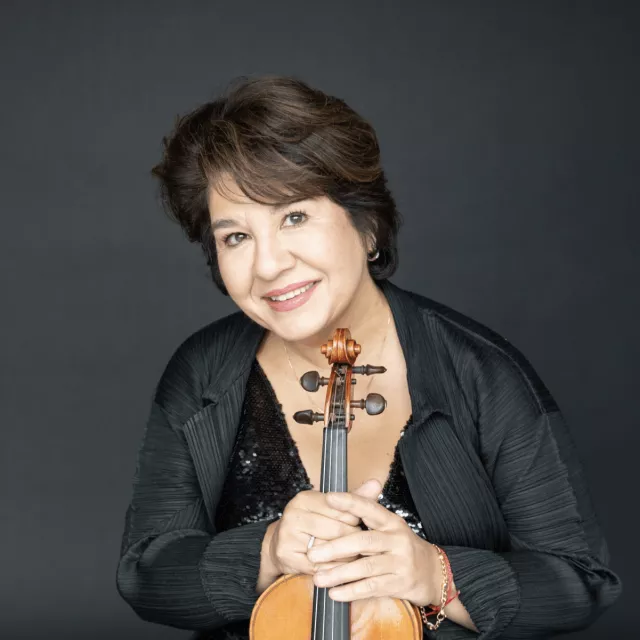Art Shall Be Free

Both Russians and Ukrainians were welcome at the Horowitz competition in Geneva. This pushed everyone involved to their limits
By Eleonore Büning/ with friendly permission of Neue Zürcher Zeitung
If a Ukrainian pianist wins a Ukrainian piano competition, the world is all in order for a while. The war seems very far away this Friday night, in Geneva. Exuberance spreads in the pompous Victoria Hall. The Steinway grand piano, work horse of the competition, has been closed and rolled to the back of the stage. Well-wishers gather at the front of the stage: jurors, sponsors, representatives of international music associations, the mayor of Geneva and the president of the culture fund from Kyiv. The puppy of the runner-up is also allowed on the stage. At some point, the lucky winner, 18-year-old Roman Fediurko, briefly holds up the Ukrainian flag to the camera. It will be rolled up again quickly: just don't risk any more trouble!
Usually, patriotism plays only a minor role in music competitions: music is not a sport, and a string quartet is not a football team. But there are exceptions. For example, at the Indianapolis Violin Competition, it is customary for the laureates' national anthems to be sung by a children's choir. Or: When the American pianist Van Cliburn won the Tchaikovsky Competition in Moscow in 1958, in the middle of the Cold War, it was a political issue of the first order. This traditional competition is one of the most important of the approximately 130 music competitions in the world. And a propaganda tool. At least since 2011, when Valery Gergiev took over the leadership, the Tchaikovsky Competition has been considered an adornment of the nation, by the grace of Putin. He proudly calls them "Olympic Games of Music" on their website.
"The hatred is terrible"
Just over a year ago, two months after Russian troops invaded Ukraine, the Tchaikovsky Competition was expelled from the community of music competitions. The decision was made at an extraordinary General Assembly of the World Federation of International Music Competitions (WFIMC). 82 out of 90 music managers from all over the world voted for to exclude the Tchaikovsky. This meeting (via zoom conference) was preceded by a speech of Andrey Malyshev, who, as a representative of the Tchaikovsky competition, tried to profusely justify the so-called "special operation".
Shortly thereafter, the board of the WFIMC decided to offer assistance to the Ukrainian Horowitz- Competition in besieged Kyiv. Since this no less traditional competition would have had to be canceled under war conditions, it was invited to be held in Geneva, the headquarters of the Federation, for its 14th edition in 2023. A gesture of solidarity combined with financial and organizational support.
With regard to the boycott of Russian artists practiced in many places, the WFIMC showed a clear flag: Art shall be free. There should be no "blank sanctions" against individual Russian musicians, it said in its corresponding statement, nor should there be "discrimination and exclusion of individual artists on the basis of their nationality". All were admitted to this competition.
However, the honorable art of music cannot remain apolitical, not even in beautiful Geneva, when rockets are falling two thousand kilometers away, hitting kindergartens, hospitals and apartment blocks. "The hatred is terrible," says Florian Riem, Secretary General of the WFIMC, "and you can't hold anything against it. With all our good intentions, we have reached our limits on both sides."
The joint organization of the “Concours Horowitz Kyiv-Geneva 2023” kept getting into difficulties. First, Russian hackers caused disruptive maneuvers: bizarre requests were made in a video conference allegedly arranged by the Ukrainian Minister of Culture Olexander Tkachenko. Tkachenko himself knew nothing about it, and as it turned out, it was a deepfake, organized to get material that could have discredited the Kiev-Geneva Connection.
Then, a fabulous young Russian pianist, Stanislav Korchagin, made it to a well-deserved semi-final with, among other things, a brilliant virtuoso interpretation of Debussy's "Feux d'Artifice". All hell broke loose on Ukrainian media, causing a huge stir with false photos, and becoming virtually impossible to control. It seemed almost a miracle that the Concours could continue over eleven days, with so many observers from all over the world, openly presented as a live stream on YouTube, and that it ended with such an audible and visible success.
Into the spotlight
At the final, the perfectly focused Roman Fediurko not only won first prize (with Robert Schumann's Concerto in A minor), but also the audience prize, as well as four of the six special prizes, totaling 38,500 francs. Getting to know the highly competent jury will probably turn out more important for him in the long run. This also applies to the two other winners: Kyoungsun Park, who took third place with his well balanced reading of Liszt's Piano Concerto No. 1, and for Julian Trevelyan, the Second Prize winner, who lightly and riskily enriched Mozart's A major Concerto KV 488 with improvisations, making the music almost float above the ground.
The jury was composed of well-known pianists such as Piers Lane and Michel Béroff, but more than a dozen other experts from all over the world followed the course of the rounds. Ariel Cohen of the Rubinstein Competition in Israel was present; Peter Paul Kainrath, current President of the Federation and Director of the Busoni Competition in Bolzano, and Jacques Marquis, President and CEO of the Cliburn Competition. The winners can now look forward to a series of recitals and concert engagements organized by other WFIMC members.
That's what music competitions are good for. There's a whole ocean of outstanding young pianists in the world. Very few make the leap from local fame to an international career. On the other hand, a music competition is only as important as its winners will be one day, because unfortunately there is also an ocean of winners, who are never heard of again later. In the end, the 2023 Horowitz Competition Kyiv-Geneva not only catapulted three individual young pianists into the limelight, each of whom would have deserved first prize. It opened doors to the future for everyone involved, which certainly would not have existed in Kyiv.
Personally, I would have liked to award another first prize to the bassoonist of Orchestre de la Suisse Romande and to the rest of this orchestra, which achieved incredible things under the direction of jury chairman Kirill Karabits: it sounded so round and sonorous, so flexible, especially in the string section, as if the musicians had been playing together for years. But the orchestra counted also twenty guest players at this final concert, freshly flown in by the National Symphony Orchestra of Ukraine.
©Neue Zürcher Zeitung ©Translation: WFIMC 2023

